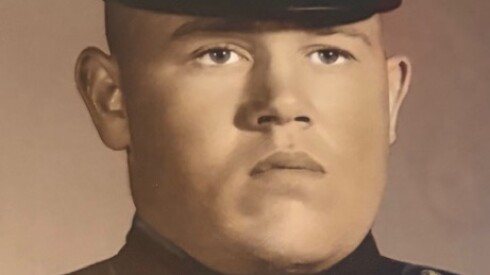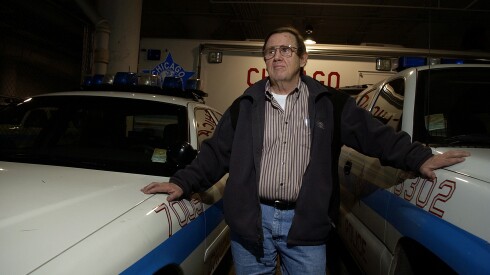The chances of Mike Cronin becoming a Chicago cop, let alone a legendary one, were slim.
A landmine left him temporarily blinded and blew his left foot off, along with part of his leg, in 1968 when he was a Marine fighting in Vietnam.
After returning to Chicago, Mr. Cronin got a job as a mechanic servicing CTA trains. He was eager to join the city police department, and tried, but couldn’t because of his injury.
In 1971, a close friend who was a cop assigned to Mayor Richard J. Daley’s security detail, told Daley about Mr. Cronin.
The next thing he knew, Mr. Cronin was called downtown and invited to apply again.
Once on the force, Mr. Cronin, a product of a North Side Irish Catholic working-class neighborhood, requested the busiest part of the city — the West Side. He became a tactical officer in a gang unit.
Mr. Cronin, who used a prosthetic to walk, didn’t just do his job and go home. He came to know more about particular gangs than many the gang’s members and leaders. He wrote down his observations in notepads that could fit in his breast pocket and filled hundreds.
“Mike Cronin was probably the best street cop I’ve ever met,” said former Chicago police superintendent Phil Cline.
“He was a hero over in Vietnam and he was a hero here in Chicago for all the cases that he made and the information he had, and nobody was better at developing informants,” said Cline, noting that Mr. Cronin also became proficient at securing and running wire taps.
He learned nicknames and gang lingo, monitored gang activities and drug sales, helped put many of their leaders behind bars and developed a reputation for fairness and fearlessness.
Mr. Cronin died Nov. 9 from natural causes. He was 81.
As technology advanced and became a key crime fighting tool, he remained convinced the best source of information came from talking to people, and he treated everyone — including gang members — with respect.
“But when they cross the line, he knows how to be the police,” former deputy superintendent John Risley told the Sun-Times for a 2006 feature on Mr. Cronin following his mandatory retirement at age 63.
Gang members knew him simply as “Cronie.”
“He wasn’t a hard ass, he was someone people could talk to, and his forte was creating an intelligence network of people who would tell him things,” said his brother Jim Cronin.
“It was an all-consuming job for him,” his brother said. “He was a bulldog. He never married, didn’t have children, and he put hours and hours in.”
Mr. Cronin was deputy chief of the Narcotics and Gang Investigation Section when he retired.
“He was, all-around, the best policeman we have had in Chicago in the past 50 years,” former Cook County State’s Attorney Richard Devine told the Sun-Times for the 2006 feature on Mr. Cronin’s career.
After his retirement, Mayor Richard M. Daley — whose father went to bat for Mr. Cronin decades prior — brought Mr. Cronin back to work as a civilian consultant to the police department. He served as a consultant for two years, his brother said.
Mr. Cronin was born Dec. 11, 1943, to Michael and Mary Cronin. Both were Irish immigrants. Michael operated a CTA train and later worked for the union that represented such workers. Mary worked as a bookkeeper for a credit union.
Mr. Cronin grew up in Edgewater and was a member of St. Gertrude Catholic Church. He attended the parish elementary school and DePaul Academy.
His career became the subject of the self-published book “On the Street Doing Life: The West Side of Chicago Through the Eyes of a Cop Called Cronie” by former Tribune reporter Anne Keegan, who became a good friend of Mr. Cronin.
Stories of working with Mr. Cronin were exchanged at his funeral services earlier this month by a slew of Chicago cops, including two former police superintendents, as well as a number of former Cook County judges and prosecutors, Mr. Cronin’s brother said.
In recent years, Mr. Cronin split time between the Chicago area, Florida and northern Wisconsin, where he enjoyed biking and playing pickleball and bocce ball.

